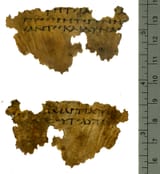>>17937121
The presbyters and episcopate of the Church led by the apostles were mandated by the Apostles to engage in the "breaking of bread," in accordance with Christ's command. The final prayer of the Roman liturgy of the Eucharist, "ite missa est," is used synecdochally to refer to the entirety of the liturgy.
What did this look like, in the earliest days of the Church?
>"Assemble on the Lord’s day, and break bread and offer the Eucharist [...]" - The Didache
>"Make certain, therefore, that you all observe one common Eucharist; for there is but one Body of our Lord Jesus Christ, and but one cup of union with his Blood, and one single altar of sacrifice—even as there is also but one bishop, with his clergy and my own fellow servitors, the deacons." - St. Ignatius of Antioch
>"Take note of those who hold heterodox opinions on the grace of Jesus Christ which has come to us, and see how contrary their opinions are to the mind of God. . . . They abstain from the Eucharist and from prayer because they do not confess that the Eucharist is the flesh of our Savior Jesus Christ, flesh which suffered for our sins and which that Father, in his goodness, raised up again. They who deny the gift of God are perishing in their disputes." - St. Ignatius of Antioch
>"“We call this food Eucharist, and no one else is permitted to partake of it, except one who believes our teaching to be true and who has been washed in the washing which is for the remission of sins and for regeneration and is thereby living as Christ enjoined. For not as common bread nor common drink do we receive these; but since Jesus Christ our Savior was made incarnate by the word of God and had both flesh and blood for our salvation, so too, as we have been taught, the food which has been made into the Eucharist by the Eucharistic prayer set down by him, and by the change of which our blood and flesh is nurtured, is both the flesh and the blood of that incarnated Jesus." - St. Justin Martyr
